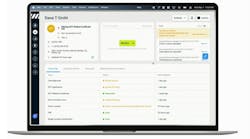fleets online
COMPANY:
Gibson Energy Ltd.
Calgary, AB
OPERATION:
Energy industry services
Larry Bilton, manager of accounting and technology for truck transportation
Problem:
As a “midstream company,” Gibson Energy moves oil, gas and other energy-related products between the producers and refiners. Along with its pipelines, terminals and storage facilities, it operates a fleet of 1,200 trailers pulled by approximately 650 owner-operators as it moves crude oil, natural gas, propane, derivatives and other related products throughout Western Canada and bordering states in the United States.
“In most cases, we create our own bills-of-lading (BOLs) when we pick up product,” says Larry Bilton. Back in the late 1990s when the fleet was creating about 25,000 BOLs a month, it recognized that it wanted to streamline the collection of that information by capturing and transmitting the data at the point of pickup.
“We also recognized that regulatory compliance — even with a fleet of owner-operators — was of growing importance,” says Bilton. “But gathering transactional data was the real driver.”
Solution:
In 2002, after a multi-year search, Gibson settled on a Windows CE onboard device from Cadec coupled with terrestrial-based wireless service. At the same time, it retired a legacy fleet management system and installed TMW Power Suite to take over the more automated interactions with the new onboard units.
“The other (onboard) truck monitoring systems we looked at didn't have the ability to capture BOL information,” says Bilton. “Cadec was even able to create customized forms for our OBCs. It fit our vision for what we wanted from an onboard system.”
Over the next four years, the company rolled out installation of the new OBCs, underwriting the cost for their leased operators. It also deployed the new TWM management system and worked to get the two interacting smoothly.
The result has been what Bilton calls “growing without growth.” Today the truck fleet creates 55,000 BOLs a month, or more than twice the number it did when the fleet began investigating onboard data capture.
“We've been able to double revenues without adding proportionally to administration,” he says. “And we've cut down the month-end time for processing BOLs from 2.5 work days to under one.”
Because it's terrestrial wireless network doesn't have coverage in some of its areas of operation, Gibson still has about 150 trucks that aren't linked to the new data collection system. Over the next few years it plans to fill in that gap with a new generation of OBCs from Cadec.
“We will be able to integrate the new ones with the ones we are already using,” says Bilton. “That scalability was what we were looking for when we decided on the Cadec and TMW combination.”
A new closer working relationship between Cadec and TMW should mean “fuller integration of data between the two systems, as well,” adds Bilton. “From our perspective, it couldn't get any better.”


